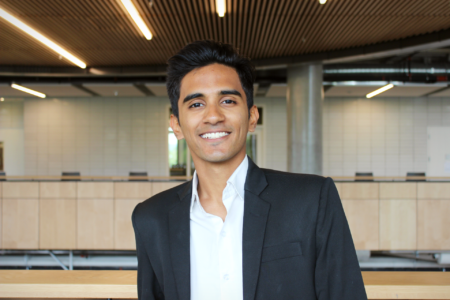
The oldest universities in the world have been around for centuries; their halls wandered by thousands, each in pursuit of their academic dreams.
It’s not too different of a feeling, though, when you’re in one of the youngest universities instead.
Places like Nanyang Technological University (since 1981) and the Hong Kong University of Science and Technology (since 1991) have made it into the top 50 of the QS World University Rankings 2025 — proof of their determination and resolution to deliver quality education.
It’s part of the reasons why Lilijana Abrell chose to study at Tetr College of Business, a school established in 2024.
View this post on Instagram
Tetr is a global educational institution offering undergraduate and postgraduate programmes in Management and Technology, Artificial Intelligence, and Liberal Arts. Abrell is enrolled in the Bachelor’s in Management and Technology.
In this programme, and the others available at the school, studying abroad is taken to a whole new level.
In four years, students get to live and learn in seven different countries — Dubai, India, Singapore, Ghana, the US, Argentina, and France.
“I’m in my second semester, and we’re in India right now,” Abrell shares. “For my first semester, we were in Dubai. It’s exciting, and I’m living my dream.”

Abrell and her coursemates from Tetr College of Business having dinner together. Source: Lilijana Abrell
Born and raised in Germany, all Abrell wanted to do was travel. While she had the opportunity to do so with her high school orchestra, it wasn’t enough; she wanted to go beyond the European borders.
“I have a passion for travelling. I love experiencing new places and meeting new people. After graduating from high school, that was all I wanted to do,” she says.
And Tetr is giving her just that.
Better yet, Abrell was learning how to build businesses in each country she’d been to.
In Dubai, she co-founded Visioglass, a business selling smart glasses, selling over 40 to 50 glasses daily. Today, in India, she co-founded a (K)notcultured, a premium streetwear brand, alongside five other students.
We caught up with Abrell to talk about her experience at Tetr College of Business and what it’s like being part of the institute’s first-ever batch of students.
Why did you choose Tetr College of Business, one of the youngest universities in the world? How has your experience been?
My parents and I weren’t exactly happy with the traditional education system during high school because of its theoretical nature. While it was beneficial, I could never apply what I learnt.
I decided to take Tetr’s practical route. Unlike traditional universities, you’ll get to build businesses beyond the classroom, and there are no actual exams — meaning no finals weeks.
Another bonus is that I get to try something new in seven different countries. I get to live my dreams by travelling the world.
My experience so far has been tremendous and positive. However, because this is a new programme, there’s still a lot to figure out, and we’re constantly seeking feedback from the faculty.
I’ve learnt a lot about running a business, both in and out of the classroom. I have also been exposed to teamwork in different environmental and cultural settings, which I think is unique. Our programme includes over 45 nationalities, and it’s crazy that I get to see how businesses are run from 45 different cultural viewpoints.
Again, because it’s a new programme, some things might not work out as planned, but it’s working great so far.

Abrell and her coursemates promoting their brand, (K)notcultured , that they founded as part of their programme. Source: Lilijana Abrell
What inspired you to study Business Management and Technology?
It’s a funny story because the decision to pursue a BS in Business Management and Technology was spontaneous.
I’m from an art background. I used to be in pre-professional music education back in high school. I played in orchestras and travelled the world to perform.
When I graduated last year, my parents wanted me to study, but I wanted to travel. I then saw an ad for Tetr on Instagram and realised that this was the best of both worlds for my parents and me.
However, the only programmes they had were business programmes, so that’s what I went with. I applied and got accepted.
Although I had no business experience, I did come up with a couple of business ideas involving green architecture when I was 14. The programme is related to sustainability and urban planning, which interests me, so I decided to pursue it.

Abrell and her classmates on a trip in India for their second semester. Source: Lilijana Abrell
Aren’t you worried about attending a newer school instead of one that’s been around longer?
Sure, I mean, that’s always a concern because I’m still just 18 years old.
I told myself, “Okay, let’s do this degree programme and see how it goes after a year.” I might even realise that this is not what I’m looking for. Even if it is not for me, I can still say that I gained a lot of experience, and I got to meet and network with people worldwide is incredible.
However, there’s one thing that lessens the fear of attending one of the youngest universities in the world. At the end of the four-year programme, I will receive a degree from Middlesex University in the UK. Since Tetr is newly established, it collaborates with Middlesex.
Even in India, where Tetr was founded, not everyone knows it. While that may disadvantage others, I think it’s a good thing. The beauty of it is that we can define what Tetr stands for.
I value experiences rather than sitting behind a desk. We also have faculty members from top universities, such as Harvard, who give us a lot of positive feedback and even offer to write us letters of recommendation.
It’s been a positive experience so far.

Abrell has co-founded three businesses during her time at Tetr College of Business, two of which are still active. Source: Lilijana Abrell
How has Tetr shaped your worldview and career goals?
Being part of Tetr has allowed me to tackle global challenges and gain firsthand experience working across borders. With global classmates to studying in seven countries, we must constantly collaborate across time zones and cultures, which is no easy task.
In business, understanding global markets is essential, and the best way to do that is through direct, on-the-ground experience. That’s why the travel and cultural immersion that Tetr provides is so valuable — it equips us with the knowledge and adaptability needed to build successful businesses.

Abrell and her coursemates at the University of Europe for Applied Sciences campus in Dubai. Source: Lilijana Abrell
What’s been the most surprising or rewarding part of launching businesses while still in school?
I always try to see things positively, even when things don’t go as planned.
For example, when we had to build a dropshipping business, it didn’t work out how we wanted it to. I still focused on the positives, however, like I learned about teamwork and collaboration.
However, one thing that surprised me about dropshipping was how much easier it became to make money when we adjusted our product offerings and refined our strategy. Looking back, I think taking the step earlier — being more flexible and willing to take risks — would have made a big difference.
The teamwork was another surprising thing for me.
When team members argue constantly or have conflicting visions for the business, it becomes almost impossible to move forward. If there’s no alignment, you might as well not even start.
I’ve seen how stubbornness, resistance to feedback, and personal conflicts can slow everything down. The real work isn’t just about executing tasks; it’s about communication, finding common ground, and maintaining productive conversations.
That, by far, has been my biggest learning.










